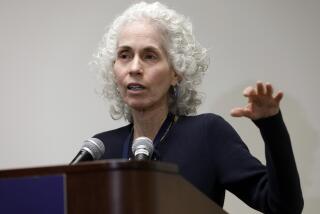‘Superbug’ staph reports required
- Share via
Responding to concerns about antibiotic-resistant “superbug” staph infections, California will now require local health departments to report all severe infections originating outside healthcare facilities, but not cases contracted in hospitals or nursing homes.
The policy, announced Thursday by the California Department of Public Health, attempts to track severe staph infections including methicillin-resistant staphylococcus aureus, or MRSA, that result in the hospitalization or death of healthy people.
Some healthcare watchdogs, saying the policy is too narrow, want the state to track severe MRSA infections that occur at healthcare facilities too, much as Tennessee does.
“You want to focus on all the serious cases, not just a small portion of them,” said Lisa McGiffert, director of Consumer Union’s Stop Hospital Infections campaign.
Although the state has the authority to add MRSA to the list of diseases hospitals must track, state health officials say the requirement could prove burdensome, because many hospital staph infections are minor, resulting in boils and other skins problems that are easily treatable.
“We want to focus on the cases that are the most severe, that cause the most morbidity,” said Dr. Gilberto Chavez, state epidemiologist.
Many hospital managers oppose reporting patient MRSA infection rates alone. They believe infection rates make sense only in the context of how big a facility is, how many patients it treats and the severity of their illnesses, said Debby Rogers, vice president of quality and emergency services with the California Hospital Assn.
“It’s valuable information, but it has to be done in a conscientious way. It can’t just be a straight number,” Rogers said.
The most recent study released by the Centers for Disease Control and Prevention found that in 2005, MRSA sickened an estimated 94,000 Americans and killed almost 19,000. Recent studies show that about 80% of MRSA infections occur in healthcare facilities.
--
molly.hennessy-fiske@latimes.com
More to Read
Sign up for Essential California
The most important California stories and recommendations in your inbox every morning.
You may occasionally receive promotional content from the Los Angeles Times.














